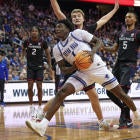As the fate of the 2020 Division I NCAA Men's Basketball Tournament danced on a balance for more than 24 hours earlier this week, the NCAA considered almost every possible alternative to saving its most prestigious event.
The one alternative that was most seriously discussed was a shrunken 16-team field of all at-large teams that would have played five days in a row at State Farm Arena in Atlanta.
NCAA senior vice president of basketball Dan Gavitt told CBS Sports on Friday that he discussed the idea with five other members of NCAA senior staff and tried to make it happen, but ultimately the selection committee voted it down as it became clearer and clearer that holding the NCAA Tournament was unlikely.
"We didn't actually reach out to anybody [in Atlanta]," Gavitt said, adding that he considered a similar structure in a different city for the women's tournament as well.
Here's how it would have worked.
Reducing the field from 68 to 16 had to mean the elimination of automatic-qualifier bids. All 16 teams would have been selected on the strength of their overall profiles for at-large consideration. Had a school or two or three or more opted not to travel and play in the event, Gavitt said the committee would have made a length overall seed list and continued down to Nos. 17, 18, 19 and so on if necessary to ask teams that would've been willing to participate.
The format would have given a slight advantage to the top four seeds, which would have opened up play against seeds Nos. 13-16 on Thursday, then not had to play again until Saturday. So it would have been No. 1 vs. No. 16, No. 2 vs. No. 15 and so forth. Teams seeded Nos. 5-8 would have played seeded Nos. 9-12 on Friday, and the winners of those games would have played Saturday, with the Elite Eight taking place on Saturday, the Final Four on Sunday and the national title game on Monday.
Had BYU been involved and made it to Sunday, the NCAA would have pushed back to Final Four and national title game to Monday and Tuesday to accommodate BYU's mandatory rule of not playing games Sundays.
"We thought it matched up, it would fit all the TV windows," Gavitt said.
This plan was informal and never broached with CBS or Turner executives because it never reached a point where it was necessary due to the selection committee shooting down the proposition in the midst of what was a whirlwind Thursday morning and afternoon.
Gavitt further explained why this was looked at as an option: he and so many others with the NCAA were trying to figure out if there was any realistic way to salvage the postseason and allow for a champion to be crowned. It makes sense as a last-ditch effort, and certainly atypical teams having special seasons across the country, from Dayton to San Diego State to Baylor to Creighton, factored even more as to why this was explored.
"Most importantly, we thought this is maybe, medically, this is a way we can do this in a very controlled way to safeguard the health of these players," he said. "One site, small travel party, charters, buses, not a lot of exposure to anybody, get them in, get them safe, play the games and determine a national champion among 16 teams. Not perfect and probably would have gotten a lot of criticism from the 52 (teams) that would have been left out. The committee was uneasy when we presented it to them. My thought all along was, 'How do we determine a national champion? There are all these teams that have earned this opportunity.'"
The medical experts who assisted the NCAA in the past 10 days also looked over this contingency and assessed it with some quick possibility, but Gavitt said it never really garnered serious consideration because the plan was hatched just as conference tournaments fell like dominoes late Thursday morning, one after another after another.
"Thursday was just, it was a downward spiral," Gavitt said.





















